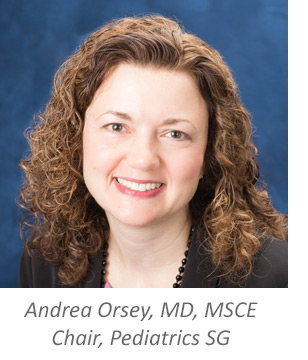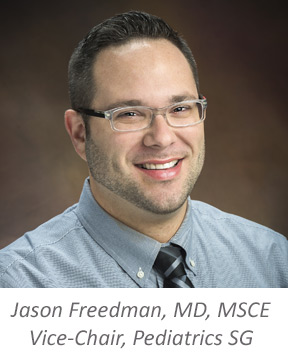2019 MASCC’s Pediatrics Study Group, led by Chair Andrea Orsey, MD, MSCE and Vice-Chair Jason Freedman, MD, MSCE, aims to promote and improve supportive care for pediatric cancer patients and survivors and to ensure that pediatric supportive care is considered in all practice guidelines, research, and clinical endeavors.
Mission and Goals
The Pediatrics Study Group (SG) aims to promote and improve supportive care for pediatric cancer patients and survivors worldwide. Its members conduct research and other projects with the following goals:
- Presence. The SG works to ensure that pediatric supportive care is represented and considered in all practice guidelines as well as research and clinical endeavors.
- Sharing Ideas and Information. The SG provides a forum for discussions and sharing of ideas aimed at advancing pediatric supportive cancer care around the globe.
- Research. Members of the SG engage in research, surveys, and other projects, and the SG provides a forum for international collaboration and exchange of ideas.
- International Standardization and Harmonization of Supportive Cancer Care. The SG seeks to identify practice variation with the dual aims of understanding and working standardization of practice where appropriate. The SG also works with other international groups and guideline development.
Current Projects
- Nutrition in Pediatric Cancer Patients. Members of the Pediatric Study Group are involved in conducting surveys around the globe. The project, led by Charles Phillips, MD at Children’s Hospital of Philadelphia, aims to assess variation in practice of nutritional assessments and interventions. This could lead to a quality improvement project or research study/development of guidelines.
- Alliance with the International Paediatrics Oncology Guidelines in Supportive Care Network (iPOG Network). The iPOG Network is a voluntary collaboration of organizations involved in development and endorsement of clinical practice guidelines for the supportive care of children who have cancer or who are undergoing bone marrow transplants. The Network shares best practices among clinicians, coordinates supportive care guideline development efforts internationally, and communicates existing evidence gaps to the research community.
Workshops
- What Does the Future Hold? Prognostication in Advanced Cancer and Clinical Decision Making. MASCC/ISOO Annual Meeting, Vienna, Austria, 2018
- Integration of Oncology and Palliative Care: Why? What? Who? When? How? MASCC/ISOO Annual Meeting, Washington, DC, 2017
- Anemia in Cancer. MASCC/ISOO Annual Meeting, Copenhagen, 2015
- Beware of Infections in Both Adults and Children. MASCC/ISOO Annual Meeting, Miami, 2014
- Survivorship Issues of Adults Who Have Had a Childhood Cancer: How Does it Affect One’s Life? MASCC/ISOO Annual Meeting, Athens, 2011
Participation in Recent MASCC Meetings
Parallel Sessions at MASCC/ISOO 2019
Parallel Session: When Carers Need Care: Burnout in Cancer Healthcare Providers and Caregivers. Chaired by Drs. Bogda Koczwara and Jason Freedman, the session included presentations by two Pediatrics SG members. Andrea Orsey, MD, spoke on challenges of juggling career and family while avoiding burnout, and Ashraf Mohamed, MD, addressed the implementation of psychosocial distress screening and intervention in pediatric oncology.
Parallel Session: Let's Talk About Sex. Chaired Drs. Orsey and Freedman, the session included a paper by Pediatrics SG member Faith Gibson, PhD, who spoke on sexual health and preparedness in survivors of childhood cancer.
Parallel Session: Cancer Survivorship Across the Life Cycle. Chaired by Drs. Lidia Schapira and Bogda Koczwara, the session included a paper by Pediatrics SG member Faith Gibson, PhD, who spoke on challenges for pediatric, adolescent, and young adult cancer survivors.
Parallel Sessions at MASCC/ISOO 2018
Parallel Session: How to Prevent Cardiotoxicity — A Real Challenge. This session, organized by members of the Pediatrics Study Group, included a paper by Pediatric SG Chair Andrea Orsey, MD, MSCE, on Evidence of Dexrazoxane (DXZ) and Other Interventions to Decrease Cardiotoxicity, and a paper by Erik Loeffen, MD, PhD, on Evidence of Infusion Duration of Anthracyclines: Does It Matter to the Heart?
Recent Research and Publications
Key research projects include the classification of acute emetogenicity of chemotherapy in pediatric patients, guideline for the prevention of acute chemotherapy-induced nausea and vomiting in pediatric cancer patients, and implementation and evaluation of an automated pediatric malnutrition screen using anthropometric measurements in the electronic health record. To name just a few topics, Study Group members have recently published work on the development of an evidence-based decision aid for parents of children with cancer and to help guide them in the use of complementary and alternative medicine (CAM) for cancer care, home care for children with cancer, research priorities for young people with cancer, severely bothersome fatigue in children and adolescents with cancer and hematopoietic stem cell transplant (HSCT) recipients, and taste changes in children with cancer and HSCT recipients. See the Study Group’s web page and a list of recent member publications.
Study Group Leaders
 Study Group Chair, Andrea Orsey, MD, MSCE, is a Board-Certified Pediatric Hematologist/Oncologist and Director of the Cancer Supportive Care Program at Connecticut Children’s Medical Center (Hartford, Connecticut, USA). She is the Associate Chair of Education, Program Director of the Pediatric Hematology/Oncology Fellowship Program, and Associate Professor of Pediatrics at the University of Connecticut School of Medicine. Dr. Orsey, who is also board certified in integrative and holistic medicine, as well as a physical therapist, develops and conducts clinical studies to evaluate the impact of physical activity and yoga on sleep, quality of life, and fatigue among children with cancer. She is part of a cross-disciplinary and cross-institutional research team studying the use of diversity outbred mice in research on cardiotoxicity of chemotherapy. She is part of a multi-disciplinary team which developed a comprehensive Cardio-Oncology program at Connecticut Children’s developing and implementing primary, secondary and tertiary heart failure prevention strategies for childhood cancer survivors. Dr. Orsey is also a member of MASCC Study Groups on Antiemetics and Neutropenia, Infection, and Myelosuppression.
Study Group Chair, Andrea Orsey, MD, MSCE, is a Board-Certified Pediatric Hematologist/Oncologist and Director of the Cancer Supportive Care Program at Connecticut Children’s Medical Center (Hartford, Connecticut, USA). She is the Associate Chair of Education, Program Director of the Pediatric Hematology/Oncology Fellowship Program, and Associate Professor of Pediatrics at the University of Connecticut School of Medicine. Dr. Orsey, who is also board certified in integrative and holistic medicine, as well as a physical therapist, develops and conducts clinical studies to evaluate the impact of physical activity and yoga on sleep, quality of life, and fatigue among children with cancer. She is part of a cross-disciplinary and cross-institutional research team studying the use of diversity outbred mice in research on cardiotoxicity of chemotherapy. She is part of a multi-disciplinary team which developed a comprehensive Cardio-Oncology program at Connecticut Children’s developing and implementing primary, secondary and tertiary heart failure prevention strategies for childhood cancer survivors. Dr. Orsey is also a member of MASCC Study Groups on Antiemetics and Neutropenia, Infection, and Myelosuppression.
 Study Group Vice-Chair, Jason Freedman, MD, MSCE, is a Board-Certified Pediatric Oncologist and Inpatient Medical Director of Oncology/Stem Cell Transplant at Children’s Hospital of Philadelphia (Philadelphia, Pennsylvania, USA). His clinical focus is blood and marrow transplantation for hematologic malignancies and hemoglobinopathies. He has a particular interest in epidemiologic and translational research within pediatric supportive oncology and aims to advance the understanding and treatment of symptoms, infections, and organ toxicities in pediatric cancer and hematopoietic stem cell transplant (HSCT) patients. He is current the Principal Investigator (PI) or Co-PI of collaborative institutional trials focused on supportive care and organ toxicity in hematopoietic stem cell transplantation. Dr. Freedman has authored several textbook chapters and peer-reviewed articles on the supportive care of children with cancer and has contributed to the development of clinical guidelines to standardize management of symptoms and toxicities associated with cancer therapy and stem cell transplant. He is also a member of MASCC’s Study Groups on Antiemetics and Nutrition and Cachexia.
Study Group Vice-Chair, Jason Freedman, MD, MSCE, is a Board-Certified Pediatric Oncologist and Inpatient Medical Director of Oncology/Stem Cell Transplant at Children’s Hospital of Philadelphia (Philadelphia, Pennsylvania, USA). His clinical focus is blood and marrow transplantation for hematologic malignancies and hemoglobinopathies. He has a particular interest in epidemiologic and translational research within pediatric supportive oncology and aims to advance the understanding and treatment of symptoms, infections, and organ toxicities in pediatric cancer and hematopoietic stem cell transplant (HSCT) patients. He is current the Principal Investigator (PI) or Co-PI of collaborative institutional trials focused on supportive care and organ toxicity in hematopoietic stem cell transplantation. Dr. Freedman has authored several textbook chapters and peer-reviewed articles on the supportive care of children with cancer and has contributed to the development of clinical guidelines to standardize management of symptoms and toxicities associated with cancer therapy and stem cell transplant. He is also a member of MASCC’s Study Groups on Antiemetics and Nutrition and Cachexia.
Both Drs. Orsey and Freedman, along with other SG members, collaborated on the development of the clinical practice guideline, Classification of the Acute Emetogenicity of Chemotherapy in Pediatric Patients (Pediatr Blood Cancer. 2019 May;66(5):e27646). The guideline provides clinicians with recommendations and information critically important in the selection of appropriate antiemetic prophylaxis. They also both collaborated with colleagues on a focused update of the 2013 Guideline for Prevention of Acute Chemotherapy-Induced Nausea and Vomiting in Pediatric Cancer Patients (Pediatr Blood Cancer, 2017 Oct;64(10)).
Get Involved!
The Study Group leaders are happy to accept new members and invite you to join in ongoing or new projects. If you would like to get involved, contact Study Group Coordinator Leslie Johnson.


